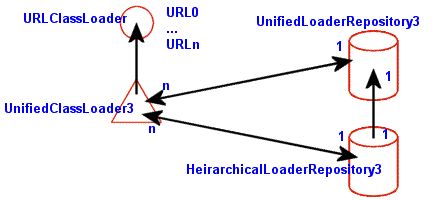Now that we have the role of class loaders in the Java type system defined, let's take a look at the JBoss class loading architecture. Figure 3.3, “The core JBoss class loading components”.
The central component is the org.jboss.mx.loading.UnifiedClassLoader3 (UCL) class loader. This is an extension of the standard java.net.URLClassLoader that overrides the standard parent delegation model to use a shared repository of classes and resources. This shared repository is the org.jboss.mx.loading.UnifiedLoaderRepository3. Every UCL is associated with a single UnifiedLoaderRepository3, and a UnifiedLoaderRepository3 typically has many UCLs. A UCL may have multiple URLs associated with it for class and resource loading. Deployers use the top-level deployment's UCL as a shared class loader and all deployment archives are assigned to this class loader. We will talk about the JBoss deployers and their interaction with the class loading system in more detail later in Section 3.4.2, “JBoss MBean Services”.
When a UCL is asked to load a class, it first looks to the repository cache it is associated with to see if the class has already been loaded. Only if the class does not exist in the repository will it be loaded into the repository by the UCL. By default, there is a single UnifiedLoaderRepository3 shared across all UCL instances. This means the UCLs form a single flat class loader namespace. The complete sequence of steps that occur when a UnfiedClassLoader3.loadClass(String, boolean) method is called is:
-
Check the
UnifiedLoaderRepository3classes cache associated with theUnifiedClassLoader3. If the class is found in the cache it is returned. -
Else, ask the
UnfiedClassLoader3if it can load the class. This is essentially a call to the superclassURLClassLoader.loadClass(String, boolean)method to see if the class is among the URLs associated with the class loader, or visible to the parent class loader. If the class is found it is placed into the repository classes cache and returned. -
Else, the repository is queried for all UCLs that are capable of providing the class based on the repository package name to UCL map. When a UCL is added to a repository an association between the package names available in the URLs associated with the UCL is made, and a mapping from package names to the UCLs with classes in the package is updated. This allows for a quick determination of which UCLs are capable of loading the class. The UCLs are then queried for the requested class in the order in which the UCLs were added to the repository. If a UCL is found that can load the class it is returned, else a
java.lang.ClassNotFoundExceptionis thrown.
